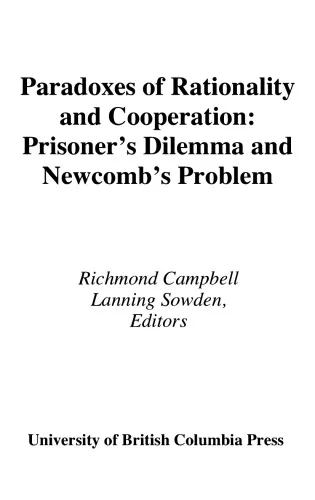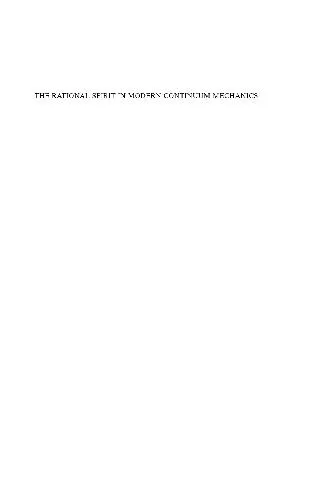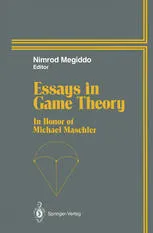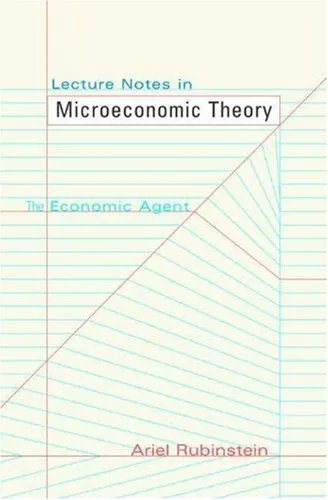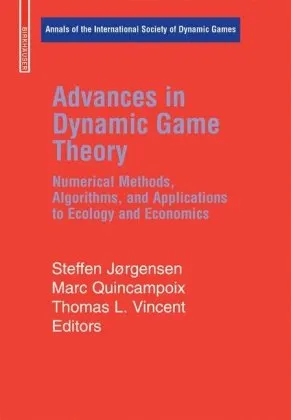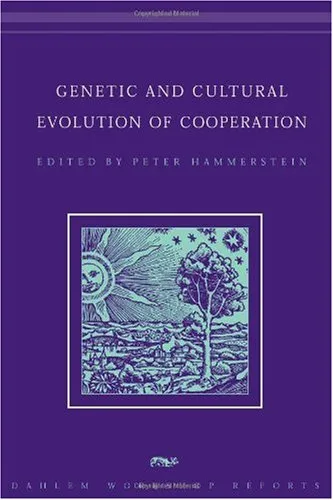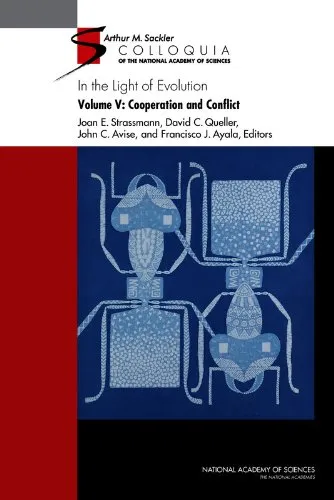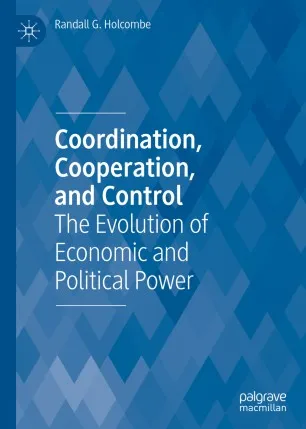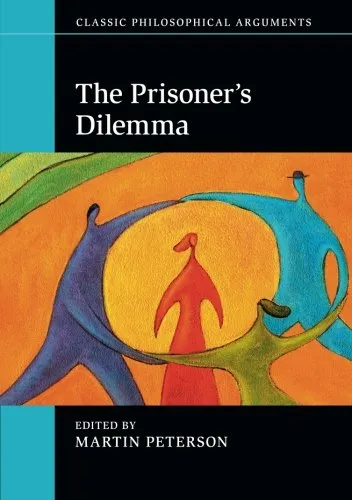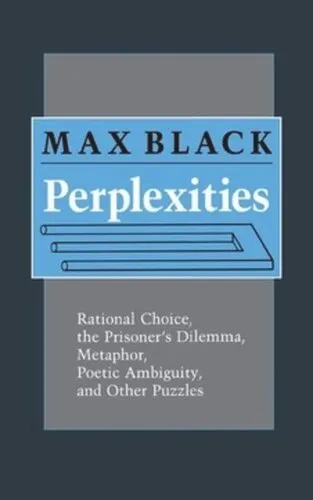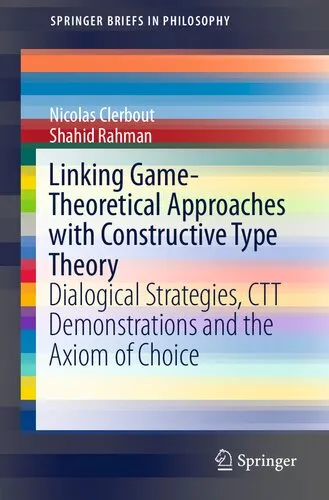Paradoxes of Rationality and Cooperation: Prisoner's Dilemma and Newcomb's Problem
4.2
بر اساس نظر کاربران

شما میتونید سوالاتتون در باره کتاب رو از هوش مصنوعیش بعد از ورود بپرسید
هر دانلود یا پرسش از هوش مصنوعی 2 امتیاز لازم دارد، برای بدست آوردن امتیاز رایگان، به صفحه ی راهنمای امتیازات سر بزنید و یک سری کار ارزشمند انجام بدینکتاب های مرتبط:
معرفی کتاب "Paradoxes of Rationality and Cooperation: Prisoner's Dilemma and Newcomb's Problem"
کتاب Paradoxes of Rationality and Cooperation یکی از آثار برجسته در حوزه فلسفه علم، تئوری تصمیمگیری و اخلاق است که توسط Richmond Campbell و Lanning Sowden نوشته شده است. این کتاب چالشهای پیچیده و پارادوکسهای موجود در منطق تصمیمگیری و همکاری انسانی را بررسی میکند. تمرکز اصلی کتاب روی تحلیل و بررسی دو مسئله معروف یعنی Prisoner’s Dilemma و Newcomb’s Problem است.
خلاصهای دقیق از کتاب
این اثر به بررسی شرایطی میپردازد که در آن تصمیمگیری منطقی به نتایج متناقض یا غیرمنتظره منجر میشود. یکی از محورهای اصلی کتاب، تحلیل مفهوم عقلانیت در شرایطی است که نفع شخصی و منافع جمعی در تضاد قرار میگیرند. مسئله Prisoner’s Dilemma نشاندهنده این است که چگونه افراد وقتی که به طور کاملاً منطقی و بر اساس نفع شخصی تصمیم میگیرند، ممکن است باعث ایجاد نتایج نامطلوبی برای خود و دیگران شوند. از سوی دیگر، Newcomb’s Problem چالش دیگری در منطق انتخاب را توصیف میکند که در آن پیشبینی رفتار و تصمیمگیری بر اساس آن، منجر به پیشآمدهایی پیچیده میشود.
نویسندگان این کتاب از ابزارهای فلسفه تحلیلی، منطق، و مدلسازی ریاضی برای توضیح این مسائل بهره میبرند و تلاش میکنند تا چارچوبهای جدیدی ارائه دهند که توانایی پاسخگویی به این پارادوکسها را داشته باشند. در طول فصلهای کتاب، بحثهایی در مورد مفهوم همکاری، اعتماد، و نقش نظریه بازیها در تحلیل موقعیتهایی که نیاز به همکاری دارند، مطرح میشود.
نکات کلیدی کتاب
- تحلیل عمیق دو پارادوکس مشهور Prisoner’s Dilemma و Newcomb’s Problem.
- بررسی مفهوم عقلانیت و چالشهایی که در هنگام تصمیمگیری به وجود میآید.
- استفاده کاربردی از نظریه بازیها در تحلیل روابط انسانی و همکاری.
- ارائه دیدگاههای جدید در مورد نقش اعتماد و اخلاق در تصمیمگیریهای منطقی.
جملات مشهور از کتاب
"The paradoxes of rationality are not merely intellectual puzzles but challenges to how we view decision-making, cooperation, and mutual understanding."
"Prisoner’s Dilemma reveals the intricate balance between personal gain and collective good, a dance as old as humanity itself."
"In Newcomb’s Problem, we confront a world where prediction and choice intersect, testing the boundaries of our philosophical assumptions."
چرا این کتاب اهمیت دارد؟
کتاب Paradoxes of Rationality and Cooperation به دلیل موضوعات منحصربهفردی که مطرح میکند، جایگاهی ویژه در میان آثار فلسفه و نظریه تصمیمگیری دارد. این کتاب نه تنها به مخاطبان خود کمک میکند تا با مفاهیم پیچیده عقلانیت و همکاری آشنا شوند، بلکه دیدگاههای جدیدی درباره چگونگی مدیریت تضادهای درونی و خارجی در شرایط مختلف ارائه میدهد. در دنیای امروزی که همکاری بینالمللی، تصمیمگیری اخلاقی، و سیاستهای زیستمحیطی اهمیت بسیاری دارند، این کتاب ابزاری ارزشمند برای درک بهتر این چالشها به شمار میآید.
به علاوه، تحلیل دقیق و ژرفنگر نویسندگان درباره موضوعات مورد بحث، این کتاب را به منبعی ارزشمند برای دانشجویان، پژوهشگران و علاقهمندان به فلسفه تصمیمگیری و نظریه بازیها تبدیل کرده است.
Introduction
The book Paradoxes of Rationality and Cooperation: Prisoner's Dilemma and Newcomb's Problem holds a distinctive place in the field of philosophy, decision theory, and ethics. Authored by Richmond Campbell and Lanning Sowden, this exploration dives deep into two of the most fascinating and perplexing problems in contemporary philosophical thought—the Prisoner's Dilemma and Newcomb's Problem. These challenges not only question the nature of human rationality but also interrogate our methods of cooperation, trust, and strategic decision-making. The authors navigate the tension between individual self-interest and collective well-being, uncovering insights that have implications far beyond their original contexts, stretching into economics, political science, and cognitive psychology.
Through a systematic analysis of these paradoxes, this book offers readers access to the latest advancements in rational choice theory, all while grounding the discussion in clear, accessible terms. With both philosophical rigor and practical insight, the authors invite the reader to reconsider how we think about reasoning, trust, and social behavior. This introduction provides an overview of the book while drawing attention to the issues it addresses, the key insights it provides, and its relevance in contemporary society.
Detailed Summary of the Book
At its core, Paradoxes of Rationality and Cooperation examines two philosophical puzzles, the Prisoner's Dilemma and Newcomb's Problem, which challenge traditional understandings of rational action. The Prisoner's Dilemma, a staple in game theory, showcases how two rational individuals pursuing their self-interest often reach suboptimal outcomes. On the other hand, Newcomb's Problem, a thought experiment centered on prediction and free will, raises questions about causality, belief, and decision-making frameworks.
The book dissects these problems with careful attention to detail and academic rigor. In the case of the Prisoner’s Dilemma, Campbell and Sowden explore the tension between short-term rewards and the potential for long-term cooperation. The authors weave together philosophical theory and psychological insight, showing how our understanding of trust, reciprocity, and rationality influences our decisions. Through analogies, examples, and real-world illustrations, they demonstrate that resolving the dilemma requires more than cold calculation—it calls for new ways of thinking about human relationships and the parameters of rational choice.
Similarly, Newcomb's Problem is analyzed through the prism of prediction and decision-making. Here, the authors delve into concepts like causal decision theory, evidential reasoning, and utility maximization. They pull apart the layers of this perplexing scenario to show how different philosophical frameworks lead to divergent, yet defensible conclusions. The tension between free will and determinism is omnipresent, inviting readers to ask whether we are truly “free” to make the best choice or constrained by predictive mechanisms beyond our control.
By the end of the book, Campbell and Sowden succeed in reframing these paradoxes, offering readers fresh perspectives and tools to wrestle with some of the most fundamental questions in human reasoning and cooperation.
Key Takeaways
- The Prisoner's Dilemma highlights the conflicts inherent in pursuing individual versus collective rational interests.
- Newcomb's Problem challenges traditional notions of free will, predictability, and causation in decision-making.
- Rationality and cooperation are not merely abstract concepts; they are foundational to understanding real-world scenarios like ethics, governance, and economics.
- Philosophical frameworks such as causal decision theory and evidential reasoning offer distinct approaches to solving complex problems, yet their application is often context-dependent.
Famous Quotes from the Book
The following quotes capture the essence of the book and the authors' insights into rationality and cooperation:
"Rationality is not a static, one-size-fits-all construct; it evolves and adapts in the presence of others."
"The foundation of cooperation is trust, and trust cannot always be distilled into a predictable algorithm."
"Paradoxes reveal the limits of our reasoning—they are not failures but opportunities for growth and understanding."
Why This Book Matters
The relevance of Paradoxes of Rationality and Cooperation extends far beyond the academic sphere. In a world increasingly shaped by complex systems and interdependent networks, understanding the mechanisms behind rational decision-making and cooperation is paramount. Whether applied to geopolitical negotiations, economic markets, or everyday relationships, the insights from this book illuminate the fundamental tensions that define human behavior.
The book's exploration of paradoxes is particularly salient in understanding contemporary global challenges, such as climate change, resource allocation, and political polarization. These issues require collaborative solutions that traditional models of rationality often fail to provide. By challenging these models and proposing new frameworks, Campbell and Sowden contribute to a deeper understanding of what it means to be rational, cooperative, and ultimately human.
This book is essential reading for philosophers, economists, policymakers, and anyone curious about the intricate dance between individual choice and collective good. It is a profound exploration of how rationality and cooperation shape, and are shaped by, the world around us.
دانلود رایگان مستقیم
شما میتونید سوالاتتون در باره کتاب رو از هوش مصنوعیش بعد از ورود بپرسید
دسترسی به کتابها از طریق پلتفرمهای قانونی و کتابخانههای عمومی نه تنها از حقوق نویسندگان و ناشران حمایت میکند، بلکه به پایداری فرهنگ کتابخوانی نیز کمک میرساند. پیش از دانلود، لحظهای به بررسی این گزینهها فکر کنید.
این کتاب رو در پلتفرم های دیگه ببینید
WorldCat به شما کمک میکنه تا کتاب ها رو در کتابخانه های سراسر دنیا پیدا کنید
امتیازها، نظرات تخصصی و صحبت ها درباره کتاب را در Goodreads ببینید
کتابهای کمیاب یا دست دوم را در AbeBooks پیدا کنید و بخرید
1398
بازدید4.2
امتیاز0
نظر98%
رضایتنظرات:
4.2
بر اساس 0 نظر کاربران
Questions & Answers
Ask questions about this book or help others by answering
No questions yet. Be the first to ask!
